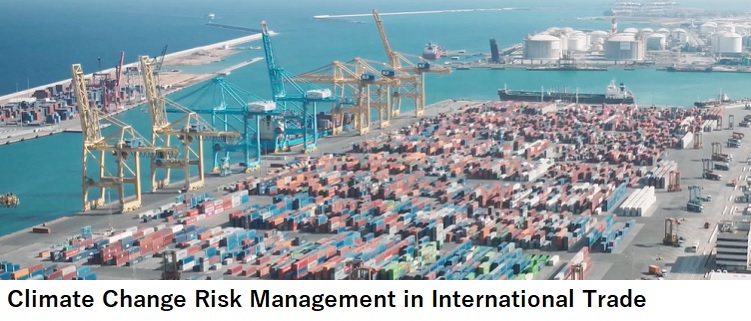
Climate Change Risk Management in International Trade
Climate change poses a significant threat to various aspects of our global ecosystem, and one area where its impact is particularly pronounced is international trade. As extreme weather events become more frequent, sea levels rise, and temperature patterns shift, businesses engaged in global trade face a host of challenges that necessitate effective risk management strategies. This article explores the implications of climate change on international trade and the measures that businesses and governments can adopt to mitigate the associated risks.
I. Impact of Climate Change on International Trade:
Supply Chain Disruptions:
Extreme weather events, such as hurricanes, floods, and wildfires, can disrupt supply chains by damaging transportation infrastructure and interrupting the flow of goods.
Changes in Agricultural Patterns:
Climate change affects crop yields and can lead to shifts in agricultural patterns. This, in turn, impacts the availability and prices of commodities, affecting international trade in food products.
Rising Sea Levels and Port Vulnerability:
Sea-level rise poses a threat to coastal infrastructure, including ports. Many major trading hubs are situated near coastlines, making them vulnerable to the impacts of climate change.
II. Strategies for Climate Change Risk Management in International Trade:
Supply Chain Diversification:
Businesses can mitigate the impact of climate-related disruptions by diversifying their supply chains. This involves sourcing inputs from multiple geographic locations to reduce dependence on a single region.
Climate-Resilient Infrastructure:
Investing in climate-resilient infrastructure, such as ports and transportation networks, can enhance the ability of countries to cope with extreme weather events and maintain the smooth flow of goods.
Insurance and Risk Transfer Mechanisms:
Utilizing insurance and risk transfer mechanisms can help businesses offset the financial losses incurred due to climate-related disruptions. Governments and businesses can work together to develop innovative risk-sharing solutions.
Adoption of Sustainable Practices:
Encouraging sustainable business practices, including the use of renewable energy, eco-friendly transportation, and environmentally responsible manufacturing processes, can contribute to reducing the overall carbon footprint of international trade.
Policy Development and International Cooperation:
Governments play a crucial role in creating policies that incentivize climate-resilient practices. International cooperation is essential for the development of standardized guidelines and agreements that promote sustainable trade.
III. Case Studies:
The Netherlands:
The Netherlands has implemented a comprehensive climate adaptation strategy that includes measures to protect its critical infrastructure, including ports, from the impacts of rising sea levels and extreme weather events.
Global Supply Chain Resilience Task Force:
The Global Supply Chain Resilience Task Force, formed by various countries, focuses on developing strategies to enhance the resilience of supply chains in the face of climate change and other global challenges.
As climate change continues to exert its influence on the global environment, proactive measures are essential to manage the associated risks in international trade. Businesses, governments, and international organizations must collaborate to develop and implement strategies that promote sustainability, resilience, and adaptability. By embracing climate-resilient practices and investing in the necessary infrastructure, the international trade community can navigate the challenges posed by climate change and work towards a more sustainable and secure future.
